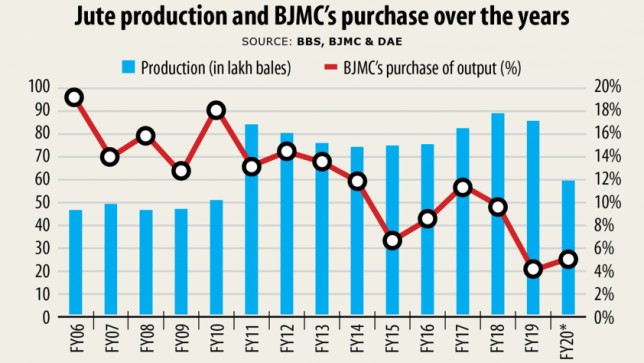Jute farmers begin harvest with wind out of their sails after BJMC’s shuttering

Farmers are set to start harvesting jute by the end of this month and for the first time since Bangladesh's independence, none of the natural fibre will be bought by the world's largest state-owned jute goods maker and exporter, the Bangladesh Jute Mills Corporation (BJMC).
The government completely shuttered 22 jute and three non-jute mills under the BJMC from July 1 and will be giving the golden handshake to 24,886 workers in a bid to end the continuing losses to the state exchequer.
The declaration comes just before the beginning of the full-swing harvest of jute, raising concerns among growers.
"This is going to affect us. Prices are likely to drop and subsequently production because of the closure of jute purchase by the BJMC," said Md Fazlul Hoque Sarker, president of the Bangladesh Jute Growers Association (BJGA), over the phone yesterday.
It is not right to close all the mills altogether without creating an alternative arrangement. It would have been better for farmers and workers had there been gradual modernisation and closure, Sarker added.
Jute production has risen in the past decade.
Farmers produce nearly 80 lakh bales of jute annually as a cash crop to profit from the purchases by state-owned and private jute mills as well as raw jute exporters.
This year farmers have increased their area of cultivation by 8 per cent year-on-year to 7.20 lakh hectares, showed data from the Department of Agricultural Extension.
Public and private mills consume more than 60 lakh bales of raw jute to make yarn/twine, sacking and hessian products, mainly for the export market, said industry operators.
And 14 lakh bales of raw jute are exported annually.
Data of the BJMC showed that it used to annually purchase more than 10 per cent of the locally produced jute until fiscal 2013-14.
Later, its purchases declined for a shortage of funds amid continuing losses.
Yet, the purchase rate declared by the public mills at the beginning of the harvesting season acted a barometer for the prices of the raw jute and the prices usually did not go below the declared rate, said a senior BJMC official seeking to remain unnamed.
"As the mills have been closed, we have not announced any rate for the coming season," the official said.
This was echoed by BJMC Chairman Md Abdur Rauf.
"As the mills are closed, there is no scope to buy jute. It will come into consideration if we can go into production through remodelling this year. But there is no plan to make purchases at this moment," he said.
Spinners who make yarn for the export market are the main buyers of the best quality of jute available. Public and private mills buy the inferior grade to make sacking and hessian clothes, said industry operators.
However, as state-run mills will no longer purchase the jute of inferior grade, it is likely to have an impact on the prices, the BJMC official said.
However, a former BJGA president, Borhan Uddin Chowhdury, believes there would be no effect on raw jute prices even after the closure of the state mills.
"Demand from the private sector would be enough," he said, adding that the demand for jute was higher than what present production was.
Private mills purchase 55 lakh bales of raw jute annually, said Shahidul Karim, secretary-general of the Bangladesh Jute Spinners Association (BJSA).
Under normal circumstances, there is unlikely to be any impact on the market, he said.
However, given the coronavirus-induced economic crisis, it is not clear what the global demand for jute goods, particularly carpets for which yarn are used, will end up being in the coming days, said the official of the BJSA, which represent jute spinners who bring in the biggest export earnings.
The BJMC played a balancing role in the jute market until now, said Abdul Quayyum, secretary-general of the Bangladesh Jute Association.
"Immediately you will see an impact. Farmers will suffer. There had been a balance of trade in the market because of purchases by the BJMC. Even if it incurred losses, it played a role in keeping the market stable."
To ensure that farmers get profitable prices for the cash crop, Quayuum, who has been involved in the sector many years, suggested that the government keep open the scope for exporting raw jute.
Raw jute exporters suffered losses owing to frequent bans on export. The government should provide incentives to them so that they can buy the natural fibre for export.
"Otherwise, jute prices will not be favourable or farmers," Quayyum added.
Farmers have to spend Tk 1,400-Tk 1,500 to produce one maund of jute, said Abdur Rashid Patwary, a jute grower at Rajbari, one of the main producing districts in the central region.
As public mills will no longer purchase jute, an impact is likely. But farmers will not suffer if the government provides subsidies, he added.
Prices of jute stood between Tk 1,900 and Tk 2,200 per maund depending on the quality, said Prabir Saha, a trader at Madhukhali of Faridpur, the biggest jute-producing district, yesterday.
The prices of raw jute declined for the coronavirus-induced fall in demand. Prices were the same the previous week, he added.
